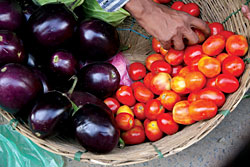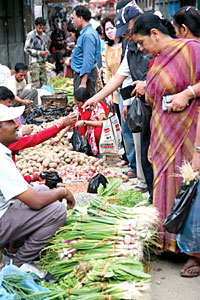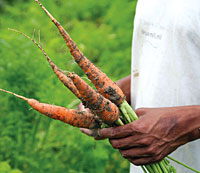 PICS: MIN RATNA BAJRACHARYA |
When government scientist Ram Pameru goes to the market he steers clear of the stacks of perfect produce and hunts for vegetables that are "infested with insects".
That, he says, is the only way to guarantee that the produce hasn't been treated with as much as 25 times the recommended dose of pesticides. Children and mothers are particularly vulnerable to pesticides, which are known to impair intellectual development and damage the immune system.
Desperate to increase yields, commercial vegetable farmers in places such as the Kathmandu Valley, Chitwan and Kabhre are drenching their produce with chemicals. They believe the recommended doses simply don't deal with pests effectively, and they can get a higher price for more aesthetically pleasing vegetables.
Farmers also use banned or out-of-date chemicals brought over the open border with India by unscrupulous traders. Often farmers dip green vegetables, especially broad leaf mustard, tomatoes and brinjal (aubergine) in malathion or mancozeb solution just before taking them to market to enhance their shiny appearance.
Researchers have discovered that potatoes have been sprayed with toxic organochlorine insecticide endosulfan at the point of purchase to give them a polished look while button mushrooms are sprayed, then packaged to keep them looking pristine. The vegetables most likely to be over-treated are tomatoes, brinjal, cucumbers and bitter gourd.
Official government figures show the legal import of pesticides had fallen from a high of 744,485kg in 2002 to 338,365kg in 2006. But imports rose steeply in 2007/2008 to spike at 762,000kg.
About 319 types of pesticides have been registered for use under the Pesticides Act (1991) and Pesticides
Rules (1993). Lindane, phosphamidon, organomercury fungicides, BHC and the dirty dozen ? the Persistent Organic Pollutants (POPS) which the 2004 Stockholm Convention listed for global elimination ? are all banned. But some still seep over the porous border, particularly DDT, which continues to be available in India for a 'grace period' to tackle malaria.
The Nepal Agricultural Research Council's numerous departments are housed in what was once an impressively elegant set of buildings near Satdobato. Now they are simply rotting away. The highly educated and concerned scientists working there wait for funding but are powerless.
"This needs to be a top government priority," says chief entomologist Shree Baba Pradhan. "We have strong rules and regulations. But implementation is the problem."
 |
This is all good news for traders who can then sell more products. "They are thriving," says Pameru. "They are highly influential in the farming communities and lure farmers into using more pesticides. The government should close them down."
Nepal has traditional ways of growing vegetables, but farmers find it difficult to go back to the old ways. The Council has new technology to start residual analysis checks at vegetable collection centres, which won't be costly. Those found using too much pesticide will be banned from taking their produce to market. The Council also wants to look into the effects of Nepali-style cooking on chemicals.
Jagadish Bhakta Shrestha, pesticide registrar at the Pesticide Registration and Management Division, says a lack of training and technology means Nepal is "a little bit behind" in terms of introducing bio and botanical pesticides, integrated pest management (IPM) systems and organic farming, but is beginning to collaborate with Indian organisations.
He admits that little can be done to bring those farmers that are knowingly breaking the law to task. Pesticide inspectors work through the district development offices in 75 districts but all they can do is try to convince farmers to change their ways. Nevertheless he claims it is a high priority because it concerns public health.
Says Shrestha: "We lack the resources to do full inspections and monitoring, which is vital."
Ten ways to limit the effects of pesticides
1. Wash your vegetables several times in water or soak them for several hours. This will reduce the levels of some pesticides but will not eliminate them.
2. Look for the imperfect fruit or vegetable. If it's been nibbled at or still contains some insects it's clearly not full of pesticides.
3. Buy organic fruit and vegetables where possible (see box opposite).
4. Try growing your own. It's remarkable how much you can grow in a small kitchen garden or even pots.
5. Only eat produce that is in season: growers attempt to lengthen the season of vegetables by treating with chemicals.
6. Buy local. Ideally from small growers who are unlikely to be able to afford to treat vegetables with a lot of chemicals. Failing that make sure it's Nepali as Indian imports may be worse. As much as 70% of the cultivated area of the country employs organic farming methods because farming is on such a small scale.
7. Peeling also reduces exposure but valuable nutrients are often lost in the process.
8. Fruit and vegetables with tough skins, like carrots, should be scrubbed with a brush to remove any pesticide residue.
9. Produce like apples and cucumbers should be peeled because the wax-laden skins tend to hold more pesticides than other produce.
10. Leafy vegetables like lettuce and spinach should be stripped of their outer leaves, which tend to collect most of the pesticide residue, and the rest should be washed carefully.
Where to go organic in the Kathmandu Valley
 |
and Bakhundole (5528468).
Email [email protected] or check www.theorganicvillage.com
The Organic Cafe and Salad Bar in Thamel (4215726, 9841286055)
Email [email protected] or check www.loveorganic.com
Organic Food Market every Wednesday and Sunday,
10AM-12.30PM
The Summit Hotel in Sanepa (5521810)
Email [email protected] or check www.summit-nepal.com


